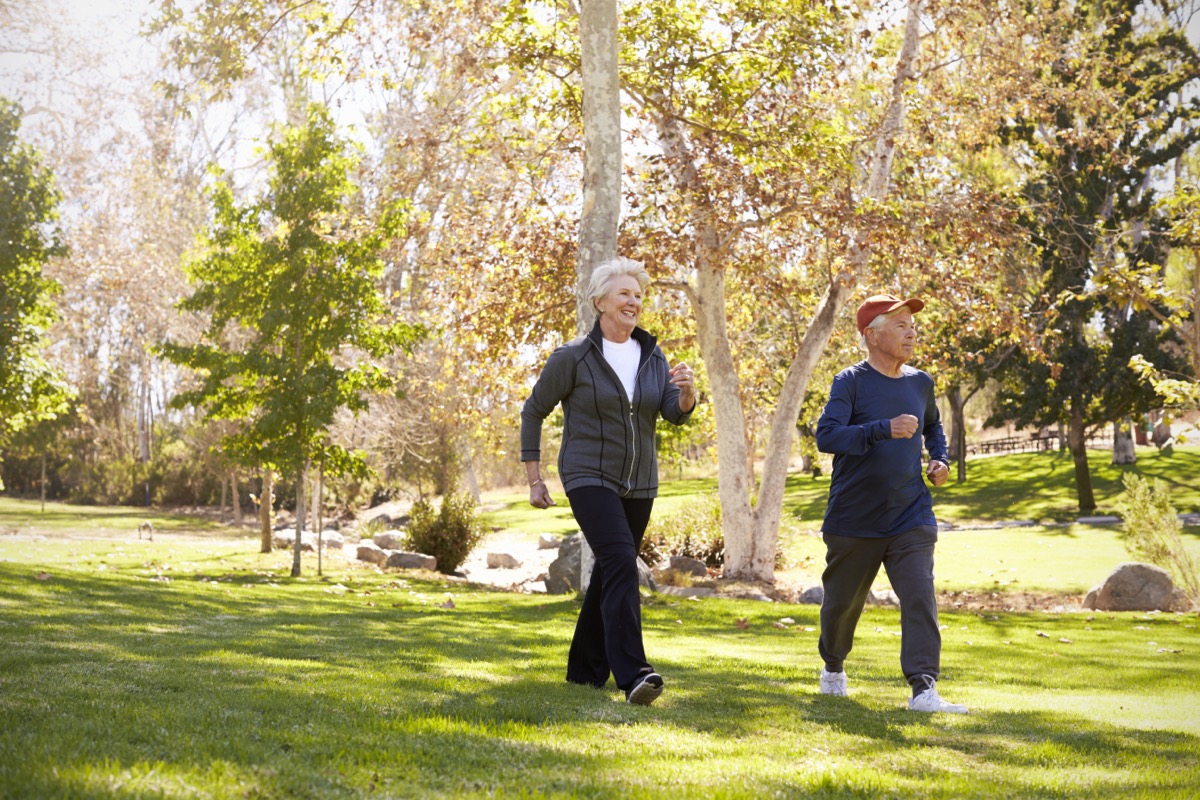The Best Times of Day to Walk for Your Health, Experts Say

Starting a new workout plan doesn’t have to be a daunting proposition—it can be as simple as taking a daily walk. In fact, experts say that by putting one foot in front of the other for just 30 minutes a day, you can reap major physical and mental health benefits. These include better cardiovascular health, stronger bones and muscles, reduced stress, a more robust immune system, a lower risk of certain types of cancer, and more, the Mayo Clinic says.
The key to success is establishing a routine you can stick to. By choosing just the right time of day, you can not only start but also sustain a walking schedule that will kick your health into higher gear. Wondering which time is right for you? Read on to learn the five best times of day to take a walk for your health, according to fitness experts.
RELATED: 8 Ways to Motivate Yourself to Take a Daily Walk.
1
Early morning

Taking a walk early in the morning is a great way to start the day feeling productive, focused, and centered. According to Adrian Todd, a fitness expert and the founder of Great Minds Think Hike, those benefits also tend to last throughout the day, since getting early morning sunlight helps with wakefulness and regulation of the circadian rhythm.
Though people are more likely to stick to their workouts when they perform them early in the day, this strategy also leaves a wide margin for error, says Louise Hateley, a physiotherapist and the director of In Stride Health Clinic. “If you generally walk in the morning but something happens—poor weather or an urgent family matter, for instance—you can still walk later in the day,” she says.
Finally, many people find this to be an especially meditative time to walk, notes Todd. “Another benefit I have personally found with early morning walks, hikes, and runs is the ability to quietly reflect. The peacefulness of the early morning allows for introspection and planning your day ahead,” he says.
RELATED: 8 Retail Brands That Sell the Best Quality Walking Shoes.
2
Mid-morning

If you work at a desk job, taking a mid-morning walk is a great way to break up long periods of sitting that can take a serious toll on your health.
“A mid-morning walk can serve as a great break from work or tasks that you’ve been focusing on. It helps to break up the sedentary time and can provide you with a burst of energy and clarity that caffeine alone can’t offer,” says Andrew White, a certified personal trainer and the founder of Garage Gym Pro. “Plus, it’s a great way to dodge the crowds that you might encounter during lunchtime or after work.”
RELATED: 5 Clothing Items You Shouldn’t Wear on a Walk.
3
After lunch

Taking a midday walk shortly after eating lunch is another great time for your health. While walking for at least 15 minutes is best, studies have shown that walking for even a few minutes after a meal helps to regulate blood sugar levels in the body, which wards off Type 2 diabetes and helps the body with fat utilization.
Studies have also shown that people tend to return to work more calm, alert, happy, and less stressed after walking during a lunch break.
RELATED: 6 Signs You Aren’t Drinking Enough Water, According to Doctors.
4
Late afternoon

For anyone who’s not an especially early riser, the late afternoon is another ideal time to take a walk. “Later in the day your energy levels often stabilize, making it a suitable time for walking or any activity that requires energy,” says Todd.
White says a late afternoon walk can also help shape the flow of your day. “As you approach the end of the workday, a late afternoon walk can serve as a transitional activity that helps you shift from work mode to personal or family time. It’s a great opportunity to reflect on the day’s accomplishments and unwind,” he tells Best Life.
RELATED: 6 Best Walking Workouts for Weight Loss.
5
Evening

Taking an evening stroll can be a calming way to wrap up the day before you wind down for bed. “The drop in temperature and quiet that comes with the night can be quite relaxing,” explains White. He adds that by walking in the evening at least an hour before bedtime, you can help improve the quality of your sleep.
If your walk is within 60 to 90 minutes after eating dinner, it also comes with the same blood sugar-balancing benefits of a post-lunch stroll.
Caroline Granger, ISSA, certified personal trainer at Fitness Trainer, agrees that evening can be an especially rewarding time of day for a walk, but also notes that it’s important to be mindful of safety concerns after dark. “Walk with a friend or stick to areas that you know are safe,” she urges.
For more health news sent directly to your inbox, sign up for our daily newsletter.